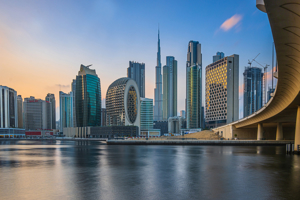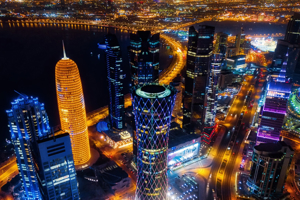The End of the SAG-AFTRA Strike & What it Means for the Middle East
Members of the Screen Actors Guild-American Federation of Television and Radio Artists (SAG-AFTRA or SAG) are hopeful that the recently announced settlement will finally see work stoppage suspended for good. The union represents a diverse array of professionals, including actors, voice artists, broadcasters, and other media workers. SAG members were on strike over an ongoing labour dispute with the Alliance of Motion Picture and Television Producers (AMPTP) since early July of this year.
While the Writers Guild of America ended their strike in September, the SAG strike continued due to several key issues. Namely, equitable residual structures for work shown on streaming platforms, disagreements over the use of artificial intelligence (AI) and the use of an artist’s likeness. Momentum towards a resolution picked up in late October but the strike remained ongoing until November 9. Both sides faced increasing pressure to reach an agreement as 2024 film slates are in jeopardy due to the length of the negotiations.
This resolution, however, will do little to alleviate the delays already caused to film and television schedules. The strike shuttered production for over 100 days and studios need to imminently resume production in order to salvage the remainder of the year’s television season. Several high-profile films have also been stalled and production facilities in the US and Europe are likely to remain swamped for months ahead as the industry tries to catch up.
Disney’s remake of Snow White and Pixar’s animated film Elio have been pushed back from their initial premieres in 2024 to 2025, along with the eighth Mission: Impossible film. Likewise, Marvel Studios has pushed the Ryan Reynolds-led movie Deadpool 3 into the spring of 2024, forcing Captain America: Brave New World give up its slot and move into the summer of 2024.
Television series such as HBO’s White Lotus and Euphoria have also been delayed until 2025 or beyond. On Netflix, highly anticipated shows like the latest seasons of Emily in Paris and Stranger Things are reported to be postponed indefinitely.
This poses a significant opportunity for production facilities in the Middle East to pick up the overflow. In recent years, the region has witnessed a surge in both the quality and quantity of film and television productions. This has been possible due to an abundance of emerging talent and high levels of government support.
This is particularly applicable to the United Arab Emirates (UAE). Boasting state-of-the-art film studios and production facilities, the UAE is a driving force behind the region’s film industry. Investments in hubs such as Dubai Studio City, for example, attract global talent with its sound stages, post-production facilities and creative spaces for film makers. The government has also created several commissions, including Abu Dhabi Film Commission and Dubai Film & TV Commission, to assist foreign film makers in producing their projects in the UAE.
The Abu Dhabi Film Commission offers access to a generous 30 percent cashback rebate on productions, including feature films, television series, commercials, other television formats, such as documentaries. While still relatively nascent, the UAE has hosted some major productions over the years such as Star Wars: Episode VII – The Force Awakens, Fast & Furious 7 and the latest Mission Impossible movie, with star Tom Cruise attending its Abu Dhabi premiere.
Likewise, since the Kingdom of Saudi Arabia (KSA) lifted its cinema ban in 2018 and implemented a series of cultural and entertainment reforms, KSA has become a raising hotspot for film production. KSA is experiencing a transformative renaissance with the establishment of the Saudi Film Council and the introduction of funding assistance and other incentives for international filmmakers, including one of the region’s highest cashback rebates of 40 percent.
Following our recent review of KSA’s offerings to productions, including the associated terms and conditions, KSA continues to be an impressive option for film and television producers looking to find production slots in the Middle East. With its dramatic desert landscapes and futuristic urban skylines, KSA is well placed to become another regional powerhouse.
As production facilities struggle with the backlogs caused by the SAG strikes, production teams should look to the Middle East for both interim and long-term production opportunities. Government support, opportunities for international collaboration and access to world-class production facilities make the region not only an attractive choice, but a practical one.
The tentative agreement comes after a stop-start negotiation which restarted in early October after SAG-AFTRA went on strike on July 14.













